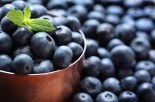Postmenopausal women are at risk of developing hypertension, arterial stiffness, and cardiovascular disease. Treatment typically involves using anti-hypertensive drugs, but many women are starting to opt for more natural alternatives.
Several studies have shown that blueberries may have powerful anti-hypertensive properties that could help improve cardiovascular health. But, just how many blueberries do you need to eat in order to gain these benefits?
Blueberries May Reduce Hypertension
John P. Higgins, MD, who is a sports cardiologist for the University of Texas Health Science Center at Houston, cites one study in particular that involved 50 postmenopausal women. Half of the women took blueberries, and after the eight-week trial, researchers found a five to ten percent reduction in hypertension in the women who ate the blueberries.
The study used around 22 grams of freeze dried, powdered blueberries. That’s the equivalent to a little less than one cup, or around 50 blueberries. Other studies have used anywhere from one cup to three cups… but that’s a lot of blueberries.
You can take supplements that contain powdered blueberries, but Dr. Higgins recommends taking the full, natural version so you don’t lose any of the nutrients or antioxidant properties in the process. Some of the antioxidants don’t make it through the process of being formed into powder, rendering it less effective.
Other Antioxidant Foods
If you get tired of eating so many blueberries, there are other fruits and vegetables you can eat that also have powerful antioxidant properties. What you are looking for are polyphenols, a type of antioxidant element that is found in wine, onions, broccoli, cherries, blueberries, strawberries, tomatoes, and plums just to name a few.
Not only will eating more antioxidant foods help keep your body running smoothly, but eating superfoods like blueberries have anti-hypertensive and vascular-protective effects. If you are experiencing negative postmenopausal symptoms and prefer not to seek medication as the first method of treatment, perhaps some blueberries a day will keep the doctor away.
In the accompanying audio segment, John P. Higgins, MD, discusses all the health benefits of daily blueberry consumption, as well as other fruits and vegetables that might have the same effects.
Daily blueberry consumption may reduce blood pressure and arterial stiffness. How many blueberries do you need to eat to get these effects?
Additional Info
- Segment Number: 1
- Audio File: train_your_body/1510tb2a.mp3
- Featured Speaker: John P. Higgins, MD
- Organization: ACSM
-
Guest Bio:
 John P. Higgins MD, MBA (Hons), MPHIL, FACC, FACP, FAHA, FACSM, FASNC, FSGC, is a sports cardiologist for the University of Texas Health Science Center at Houston, Memorial Hermann-Texas Medical Center and the Harris Health System. His research interests include the effects of energy beverages on the body, and screening for underlying cardiovascular abnormalities in 12-year-olds (sixth graders), and steroid effects on the cardiovascular system.
John P. Higgins MD, MBA (Hons), MPHIL, FACC, FACP, FAHA, FACSM, FASNC, FSGC, is a sports cardiologist for the University of Texas Health Science Center at Houston, Memorial Hermann-Texas Medical Center and the Harris Health System. His research interests include the effects of energy beverages on the body, and screening for underlying cardiovascular abnormalities in 12-year-olds (sixth graders), and steroid effects on the cardiovascular system.
- Length (mins): 10
- Waiver Received: No
- Host: Melanie Cole, MS
Published in
Train Your Body
